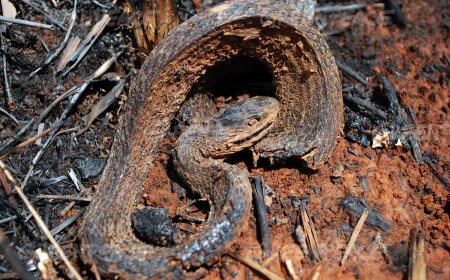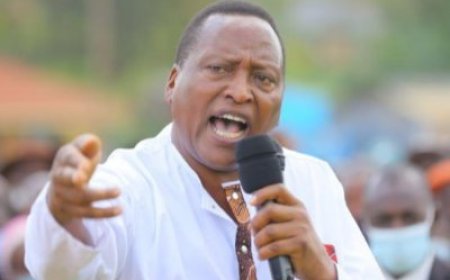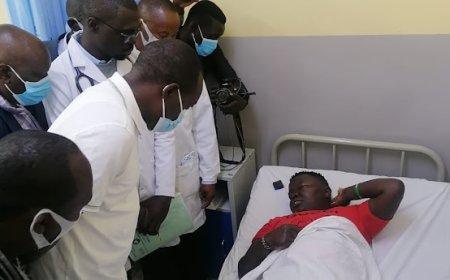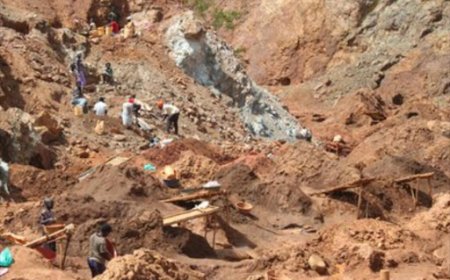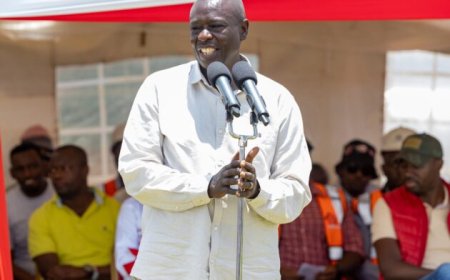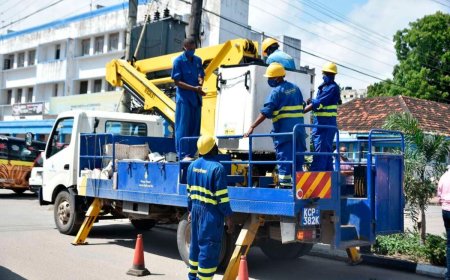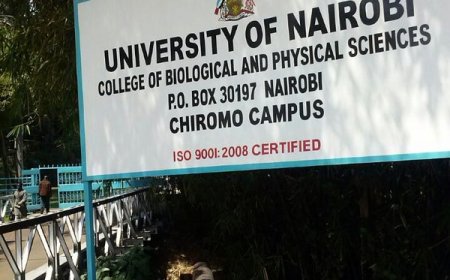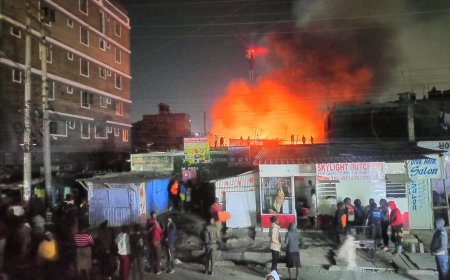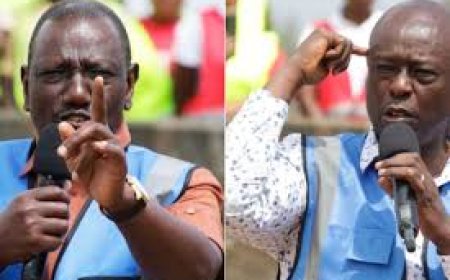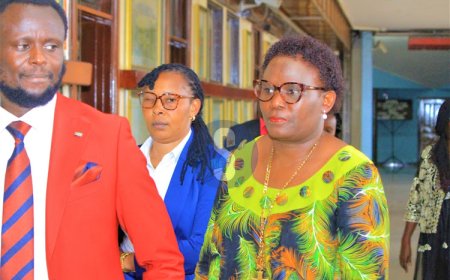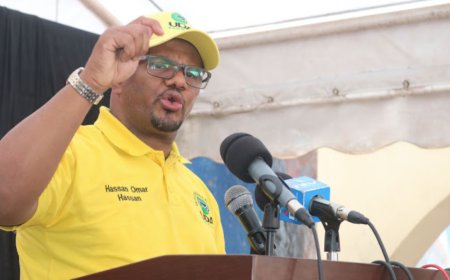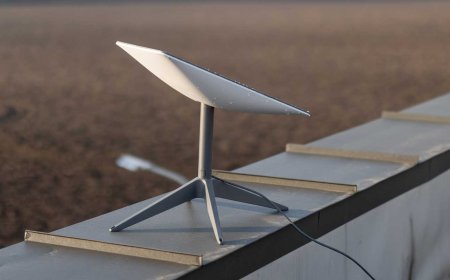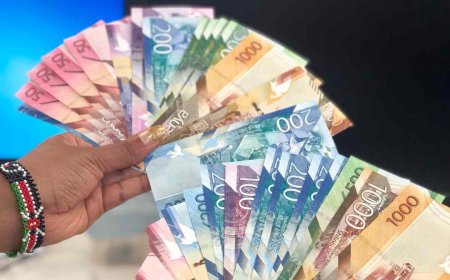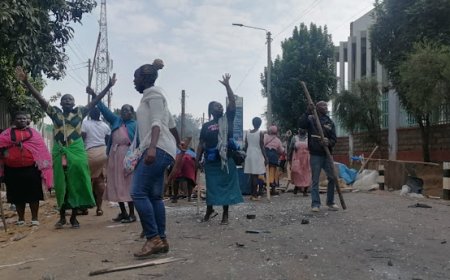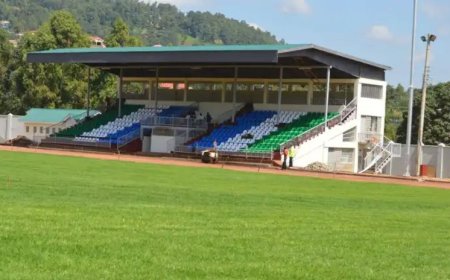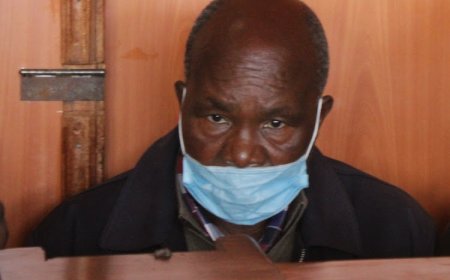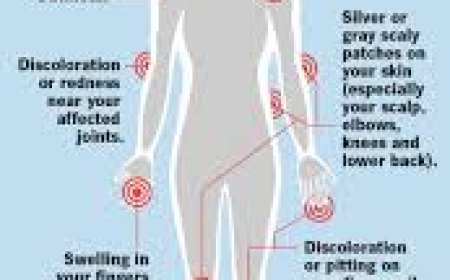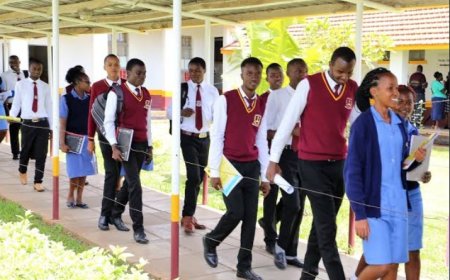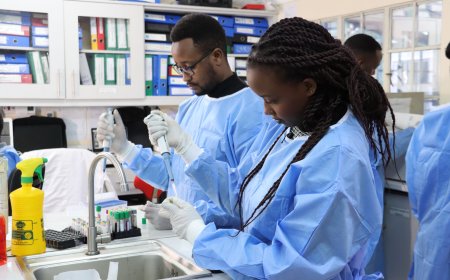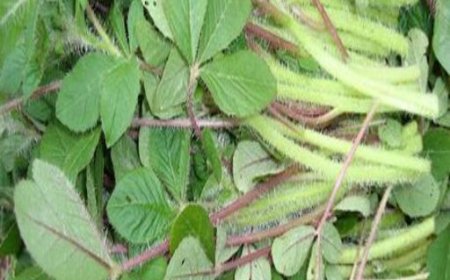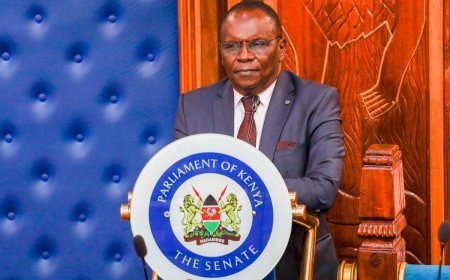PRESIDENT RUTO`S 61ST MADARAKA FULL SPEECH
The reason for marking this day is, principally, that the aspirations which motivated our heroes over six decades ago are not only alive today, but they are also the bright flame that sets our souls and minds alight with ambition and urgency and illuminates the path for each one of us to pursue the progress and prosperity of our households, families, and nation.
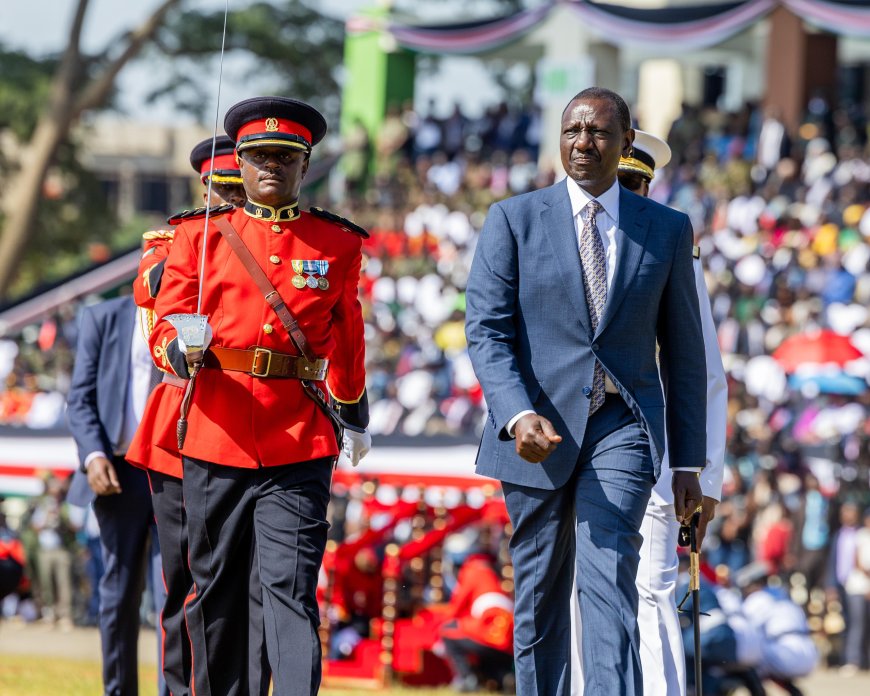
Did you miss President Ruto`s Speech on 61st Madaraka celebrations that took place in Masinde Muliro Stadium Kanduyi? Here is the full speech
“It is a great honour for me to join you here at this stadium named to honour the memory of one of Kenya's finest sons, illustrious freedom fighters and exemplary leader, Masinde Muliro, and to lead Kenya in celebrating the 61st Madaraka Day. On this anniversary, we mark the emphatic success of our freedom struggle, the triumph of the many gallant men and women who made immense sacrifices for the cause of freedom and justice, and the vindication of the principles and values which inspired the people of Kenya to stand as one, resist oppression and unite to claim their sovereignty, and to win the freedom to build a nation in accordance with their aspirations.
The reason for marking this day is, principally, that the aspirations which motivated our heroes over six decades ago are not only alive today, but they are also the bright flame that sets our souls and minds alight with ambition and urgency and illuminates the path for each one of us to pursue the progress and prosperity of our households, families, and nation.
Madaraka, our self-governing mandate, is not an accident in our history. Rather, it is the affirmation of the timeless values embraced and articulated by our ancestors in their resistance to colonial invasion and the culmination of the vision and passion of the succeeding generation which bravely took on a mighty empire and won.
Today, we are no longer at the starting blocks of the race to progress; we have come a long way. In the course of our journey, we have made Kenya a strong State anchored by a people united by fierce patriotism, love for one another, a shared vision of progress and a public service with a high capacity to coordinate development and security. Additionally, our country is a thriving, competitive and diversified economy well into its transformational take-off, and a democracy which protects freedom, drives democracy, and places the people of Kenya at the front and centre, as the authors and beneficiaries of this nation's affairs.
Therefore, every person in this country has the freedom and opportunity to make their contribution by giving their best in what they do. This is the source of our glory. Madaraka recognises that Kenya's freedom was won by resolute farmers and determined workers on their shambas, and their brave sons and daughters in the forests, cities, factories, and plantations.
Madaraka reminds us not to look down upon the labours of others, regardless of their occupations, because work makes a great people and a strong nation. Rather, Madaraka encourages us to do whatever we must to honour and support everyone who works because that is the best way of achieving prosperity and security. Madaraka Day celebrates the birth of a nation out of the totality of the labours of millions of its people.
Today is the day to remember that all work is important, every hustle matters, and that nation-building is a bottom-up affair. Let no one look down upon the life or livelihood of another and let no one be made to feel despised because of their work. Our economy depends on every form of service and labour.
From the milling of sugarcane, millet and sorghum to the ginning of cotton and the roasting of coffee beans in this county, our agriculture sector continues to fire the powerful engine of economic transformation to propel this great nation into a foodsecure, internationally competitive trading giant that can hold its own in the East African Community and leverage other trading frameworks such as COMESA, African Growth and Opportunity Act (AGOA) and African Continental Free Trade Area (AcFTA) with ease. Agriculture remains sufficiently attractive enough to sustain investment in every node of the food system.
Agriculture’s direct contribution to our GDP is 25 per cent, while its indirect support to other economic pillars such as manufacturing boosts the GDP by a further 27 per cent. Agriculture also employs, directly or otherwise, an estimated 40 per cent of our population.
To build a robust and thriving economy, enhance social inclusion and improve environmental conservation in this critical sector, the government has deployed an agriculture-led, whole-ofsociety approach in the form of the Bottom-Up Economic Transformation Agenda, of which agriculture is a critical strategic pillar.
Under the Bottom-Up Economic Transformation Agenda, we will reduce hunger, fight poverty, and improve the health outcomes of Kenyans. I am particularly delighted that agriculture and food security are the chosen theme of this year’s celebrations.
We appreciate the determination of small-scale farmers, who are the backbone of Kenya’s agricultural sector, in their efforts to produce sufficient and varied food to meet their nutritional, health and other daily needs. Against many odds, our farmers have defied systemic and structural constraints and limitations to make a contribution to household and national food security requirements, and to propel the economy. We understand, cherish, and value them.
Consequently, we have partnered effectively with farmers and other food system value chain actors such as input suppliers, producers, processors, and support service providers to transform their productivity beyond subsistence and enhance the country’s food security. This has been made possible through interventions in key value chains like maize, livestock, tea, coffee, edible oils, cashew nuts, pyrethrum, flowers, avocado, and macadamia nuts. We now have the potential to become competitive regionally and globally by utilizing the unique capacity of cooperatives to mobilize production on scale through the provision of government supported agricultural extension services.
The sugar industry is a highly strategic sub-sector, whose value chains have been the mainstay of the local economies of our sugar belt, and a generator of much-needed jobs. For this reason, we are firmly committed to ensuring that the sugar industry returns maximum value to all actors in its value chains, beginning with the initial and foundational entrepreneur: The cane grower. To accomplish this, we have implemented a number of radical measures: We have written off Sh110 billion worth of sugar factories’ debts accumulated over 40 years. A new leasing model that will guarantee prompt payment for cane deliveries by farmers, timely wages for factory workers and bonuses to sugar cane farmers every end of the year, like other crops. I call upon relevant agencies to accelerate the review process and to incorporate proceeds from by-products. As part of my commitment to invest Sh2 billion into sugarcane development through State-owned mills, after leasing is completed, I am proud to announce that the government has approved the first tranche of KSh600 million for seed cane development, and the National Treasury shall shortly release these funds.
Recently, smallholder tea farmers exported KETEPA’s value added teas to West Africa and China. The government has also increased farm-to-table food safety through frameworks such as the Food Safety Policy, and a Food Safety Coordination Bill.
To enhance our capacity to coordinate agricultural production and deliver services to the sector more efficiently, we are developing and integrating a farmers’ and agripreneurs database into the Kenya Integrated Agriculture Information System. As we speak, the database already has 6.4 million registered farmers, and our aim is to serve them better by improving access, sharing and utilization of information in the agricultural sector.
The power of this database is beyond doubt. In recent months, farmers have been able to access subsidized fertilizer from the Fertilizer Subsidy Programme, as well as animal feed and certified seeds more easily and affordably. Since we began to distribute subsidized fertilizer last year, 15 million 50kg bags of crop- and soil-specific fertilizers have been distributed.
Our strategic interventions have led to a marked increase in value addition initiatives. Measures are underway to boost coffee productivity from 2kg to 10kg per tree and from 50,000 metric tons to 102,000 metric tons a year by 2027. Under the coffee sector reforms that we initiated, a KSh4 billion coffee cherry fund was established, Sh2 billion of which has been paid, with the balance allocated for payment in the 2024/2025 financial year. This will ensure farmers get good returns for their investments. We are also writing off Sh6.9 billion debt owed by coffee cooperatives.
In the edible oils value chain, the government's plan involves boosting the production of sunflower, palm oil and canola by working with counties. In 2023, 70 tonnes of sunflower seeds were purchased, with 40 tonnes distributed to farmers. Another 40 tonnes of seed have been allocated to the Agricultural Development Corporation for seed multiplication. Additionally, the government, through the Agriculture and Food Authority, has procured and distributed 500 metric tonnes of seeds, worth KSh241 million, to farmers in 24 counties. In the 2024/2025 financial year, Sh414 million has been budgeted for this programme under the National Edibles Oils Promotion Project.
We are on course with our plan to increase cotton production from 2,500 bales in 2022 to 107,000 bales by 2025 and modernise ginneries. The aim is to expand cotton farming from 9,300 acres in 2022 to 41,000 acres in 2023, distributing 15,700kg of seeds to farmers in Busia and another 20,000kg to farmers in Meru, Makueni, Kitui and Machakos. Subsidised fertiliser will be provided through the tried and tested e-voucher system.
Additionally, 5,000 acres have been harvested in Lamu. The government has also worked with stakeholders to negotiate a price increase for farmers from Sh54 a kilo to Sh72. In the 2024/25 financial year, Sh150 million has been allocated for the Cotton Industry Revitalisation.
We have all witnessed the negative effects of climate change, most notably through extreme climatic phenomena. Last year, a long, bitter drought ended, giving way to a spell of vicious storms and devastating floods. It is now clear to us all that climate change presents serious challenges to food security and economic recovery.
The flooding, mudslides, and landslides that the country has experienced in the past six months may have slowed us a little. However, the effects of global warming have not killed our resolve to become food secure and grow economically. Instead, climate-related risks and hazards have strengthened our determination to increase investment in climate action to build resilience against the disruptive forces of nature.
The government will continue to champion afforestation and the restoration of degraded landscapes and mobilize Kenyans to plant trees throughout the Republic to restore the environment and biodiversity. We encourage increased use of climate-smart technologies such as mobile grain driers, mobile soil assessment laboratories and irrigation.
We have made progress towards fulfilling our commitment to build 100 dams and 1,000 small dams in different parts of the country, to facilitate sustainable water use and increase irrigated land by 500,000 acres by 2026. The government is in discussions with the African Development Bank and other multilateral institutions to implement this program.
To control livestock diseases and pests, the Kenya Veterinary Vaccines Production Institute (KEVEVAPI) produced 35 million doses of assorted livestock vaccines in 2023.
To bring young people into farming, we have revitalized the 4K and Young Farmers clubs to interest and introduce children to agriculture. This administration has invested more than Sh2.2 billion in the promotion and financing of agribusiness entrepreneurship and supported initiatives such as incubation and project management.
On this 61st Madaraka Day, we join the people of Bungoma, Kenyans of goodwill and friends of Kenya to acknowledge the contributions that food chain value actors have made towards the country’s food, nutritional and economic needs.
The food value chain actors who exhibited their goods and services in the run-up to this celebration include outstanding individuals, input suppliers and service providers, farmer producer organisations and co-operative societies other service providers in digitally-enabled agriculture, financial institutions supporting agri-business, research institutions, food processing entities, ambassadors of our development partners and insurance companies which have helped us strengthen the bottom over the past 12 months.
Kenya’s farmers have made remarkable progress in their efforts to make safe, nutritious, and sufficient food available to every citizen all year round. Since December 2023, through collective efforts and determination to increase household food stocks and improve food production, we have stabilised the country’s food security situation.
Arid and semi-arid lands (ASALs) cover about 80 per cent of Kenya and hold about 60 per cent of our livestock population. Approximately 14.6 million Kenyans, who live in the ASALs, derive their livelihoods primarily from the livestock sector, which contributes 12 per cent to the country’s GDP and employs 50% of the agricultural labour force. ASALs and the livestock sector are therefore critical to the nation's food security.
To actualise the Bottom-up Economic Transformation Agenda in relation to the livestock sector, the government is focusing on commercialising and reforming the sector and improving livestock performance.
Our commercialisation agenda has given priority to leather, dairy and red meat value chains under projects like the Livestock Commercialisation Project, which supports 110,000 vulnerable youth- and women-led livestock-dependent households in 10 counties. The project has developed solar-powered boreholes and water pans, rehabilitated several livestock markets and slaughterhouses, bred thousands of animals, provided agricultural equipment, pasture and fodder seeds, and trained the youth in animal health.
We are invested in developing our leather sub-sector to support competitive export industries supporting many thriving enterprises and households. In this connection, we have committed to implement strategies aimed at increasing incomes from Sh15 billion to Sh120 billion a year, multiplying job opportunities from 17,000 to 100,000 and raising annual footwear production from the current 8 million to 36 million pairs worth KSh72 billion by 2027.
It is essential to our strategy that we transform the leather value chain from one driven by exports of raw material and semi processed products to a sophisticated industry manufacturing internationally competitive finished leather and leather products, thus mopping up to 3 million hides and 18 million skins produced each year. We are developing local capacity to handle hides and skins to provide quality raw material, tanning as well as the local manufacturing of finished leather goods such as shoes, bags, and belts.
Financially, our commitments are as follows: Sh400 million has been allocated to upgrade the Ewaso Ng’iro South Development Authority’s leather factory. Sh200 million of the funds will be used to acquire modern equipment, KSh100 million to build a footwear factory and Sh100 million to mop up hides and skins. Machinery for increasing processing capacity at the factory has already been procured and installed. To supply quality hides and skins, 703 players have been trained and subsidised flaying equipment provided to 680 slaughter points.
At the same time, the construction of the Kenya Leather Industrial Park at Kenanie, Machakos County, is 85per cent complete. This park will have a common effluent treatment plant, 2 tanneries, 2 leather manufacturing plants and 100 acres for investors to set up leather factories by the end of the year.
In the dairy industry, we are committed to enhancing annual milk production from 5.1 billion litres to 10 billion litres by 2027, raising the market share of processed and formally marketed milk from 30% to 50 per cent. This will lead to an increase in processed milk exports of 1 billion litres a year by 2027. The value of processed milk increased by 7.4 per cent from 755 million litres in 2022 to 811 million litres in 2023. Sh600 million was released last week to New KCC to pay farmers promptly as part of the buildup of the milk revolving fund, which is estimated to be Sh3 billion.
The government's 6-point plan for the dairy industry covers, among other actions, installing milk coolers in dairy cooperatives, providing tax incentives, reducing trade barriers, and establishing a dairy stabilisation revolving fund to manage milk surpluses and deficits, and promoting higher nationwide milk consumption to improve health, especially the growth and development of young Kenyans.
The government's interventions in the red meat value chain are similarly robust and have led to an 8.6 per cent increase in meat exports from 15,000 metric tonnes, valued at Sh9 billion in 2022, to 16,000 metric tonnes valued at KSh10 billion. There has also been a 42 per cent growth in the export of live animals from 33,000 animals in 2022 to 47,000 animals in 2023. The government will build 450 fenced feedlots in 31 counties to increase annual red meat production by an additional 108,500 metric tonnes valued at Sh54 billion.
To sustain high livestock performance, several interventions have been undertaken with the aim of improving genetics and eliminating feed-water supply constraints, diseases, and barriers to market access. Key actions include the implementation of a countrywide breed improvement programme in collaboration with the counties and to upgrading of dairy and beef breeds. In 2023, the Kenya Animal Genetic Resource Centre provided farmers with 900,000 doses of bull semen with the aim of increasing production and productivity. I have directed that the cost of sexed semen be brought down from Sh8,000 to under Sh3,000 which will enable dairy farmers to increase the production and productivity of milk.
Likewise, a goat artificial insemination (AI) station at the Animal Health and Industry Training Institute Ndomba, Kirinyaga County, has produced 48,000 doses of goat semen and trained 80 goat inseminators.
Veterinary services are essential to safeguard animal and human health, improve animal welfare and productivity and ensure the production of safe, high-quality animals and thus promote food security and domestic, as well as international trade.
I want our livestock farmers to work with confidence and rest assured of consistent, reliable, and effective provision of vaccines. In 2023, the modernised Kenya Veterinary Vaccines Production Institute produced 35 million doses of assorted livestock vaccines.
To enhance livestock disease and pest management, the government is launching a national vaccination programme to eradicate the PPR disease and control the Foot and Mouth Disease. Under this programme, more than 22 million cattle will be vaccinated against foot and mouth disease, while 50 million goats will be vaccinated through a collaborative nationwide exercise.
The government will provide vaccines and facilitate vaccination, while county governments will provide logistical support and human resources. 1,500 veterinary surgeons and 6000 animal health assistants will provide health and husbandry services to our farmers.
To facilitate the holistic development of the livestock sector and anchor all its value chains in a sustainable strategic platform, the government is implementing several policies and legislative reforms and improvements to transform the livestock sector, guide training institutions and provide a predictable environment to attract investments. These frameworks include the Veterinary Policy, Livestock Policy, Livestock Bill, Livestock Masterplan, Food Safety Policy, and Food Safety Coordination Bill. All these are at various stages of consideration by the Cabinet and Parliament.
To guarantee the sustainable availability of a well-trained, highly skilled, and knowledgeable workforce needed by the sector, 1,700 students were enrolled in various livestock training institutions in 2023 to study animal health and husbandry, leather technology, dairy technology, and meat inspection.
Similarly, our support for productivity in the livestock sector extends to fisheries, aquaculture, and the blue economy. We have established 11 new landing sites in the coastal region and financed the operation of beach management units in Shimoni and Liwatoni, which have been equipped with commercial fishing boats.
We have done the same in the Lake Victoria region, where 11 fish landing sites have been established at various points on the shores of Lake Victoria, and beach management units set up and equipped with fishing boats. In addition, we are setting up two hatcheries, one in Kabonyo to restock Lake Victoria, and another in Shimoni to serve the Indian Ocean.
Agriculture is the engine of our economy. It strongly complements manufacturing, export trade, and micro-, small, and medium enterprises and indirectly supports our health agenda. The bottom-up economic transformation of Kenya requires us to mobilise with urgency and pursue intentional undertakings to catalyse and sustain a revolution in our shambas that will reverberate in our urban areas, towns, and cities.
To accomplish this, we have committed to implement strong interventions on three different points, all aimed at promoting a robust bottom-up economic resurgence. As already discussed, we made a defining choice with our pledge to discontinue wasteful consumption subsidies and instead invest in supporting production.
The second fundamental intervention was to enhance national revenue mobilisation, engaging more eligible taxpayers and ensuring that due revenues are collected. It is critical to emphasise that the resolve to invigorate tax revenue mobilisation was accompanied by an implicit and explicit undertaking: That the government would not compromise on its responsibility to steward public resources with utmost prudence, transparency, and accountability. This commitment is irrevocable: We must live within our means by raising our own revenue and spending it carefully and wisely. Every officer in the public service, starting with me, shall be held to full account for all resources under their authority.
The third critical strategic decision was to invest intensively in agriculture and food security, together with other pillars of BETA, in order to stimulate growth in the productivity of our farmlands and rural economies. But having done so, it is necessary for us to enhance market access for our produce and products, locally, regionally, and beyond.
To enhance access to credit by farmers, in the next financial year, we are allocating Sh1 billion to the Agricultural Finance Corporation to provide affordable credit to farmers. Additionally, we are collaborating with Afriexim Bank to provide Sh15 billion to AFC to support increased lending to farmers. The Indian Exim Bank will also support AFC to enhance our agricultural mechanization agenda, providing farm inputs to farmers at low rates.
I want the people of Kenya to understand that our advocacy of integration is part of our traditional commitment to regional cohesion and solidarity, the Pan-African imperative, and the expansion of market access and linkages with trade and investment counterparts for our producers, beyond our borders.
I stand here, therefore, to urge our farmers and other agriculture sector entrepreneurs to work with renewed confidence, with the assurance that the fruit of their labour will meet demand in Kenya, East Africa, the Common Market for Eastern and Southern Africa, and the African Continental Free Trade Area.
Further abroad, we have secured quota-free and duty-free access to the 27-country European market for produce exports from Kenyan farmers under an Economic Partnership Agreement between Kenya and the EU.
I also wish to report that during my recent visit to the US, we negotiated the renewal of the African Growth and Opportunity Act, an instrument which has enhanced access to the US market for African exports, and catalysed the rapid growth of Kenyan exports, especially in the textile and apparel industry.
My call similarly applies to Kenyans from all walks of life. Let us keep working hard, embrace broader visions and dream more ambitious dreams so that the tide of bottom-up economic transformation can sweep us all into our collective destiny of shared prosperity.
Thank You, God bless You, God Bless Kenya.”
What's Your Reaction?







